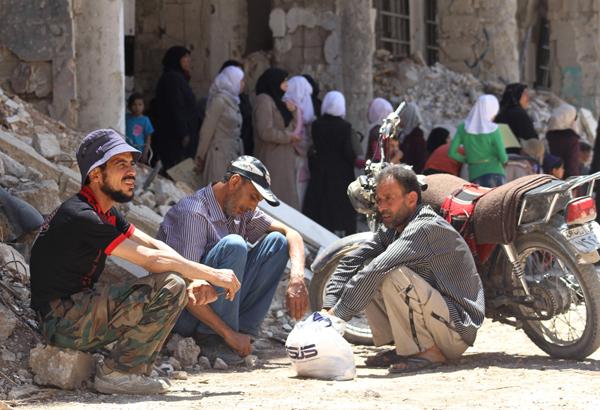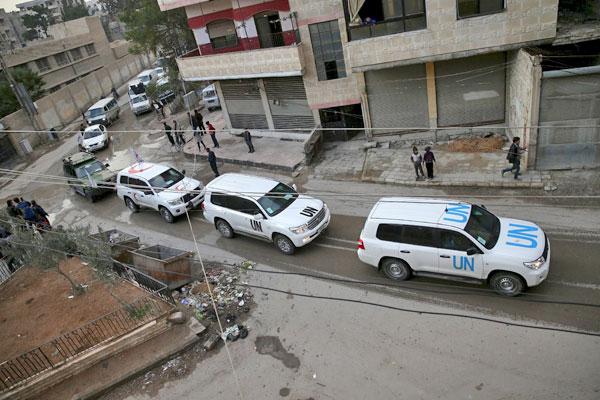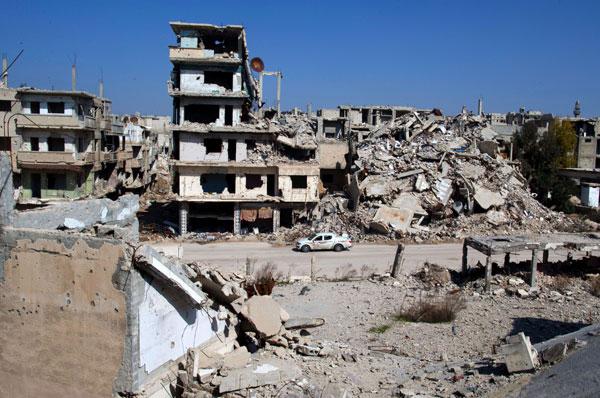You are here
US and Russia scramble to save Syria truce
By AFP - May 24,2016 - Last updated at May 24,2016

Syrian men sit next to a damaged building in the town of Daraya, southwest of central Damascus, on Sunday (AFP photo)
BEIRUT — Washington and Moscow scrambled to salvage Syria’s shaky ceasefire on Tuesday as the country reeled from jihadist bombings that killed more than 160 people in President Bashar Assad’s coastal heartland.
A regime offensive outside the capital has severely strained an already fragile nationwide ceasefire between the regime and moderate rebels intended to pave the way for peace talks to end the five-year conflict.
The latest attempts to salvage the truce come after at least 161 people were killed in car bombings and suicide attacks on Monday in the northwestern cities of Jableh and Tartus that were claimed by the Daesh terror group.
The US envoy for Syria late Monday urged rebels to respect the February 27 ceasefire after they gave its brokers — Washington and Moscow — until Tuesday afternoon to stop the advance on rebel bastions outside Damascus.
“We recognise that the CoH [Cessation of Hostilities] is under severe stress, but believe that to abandon it now would be strategic error,” Michael Ratney said in a statement on Twitter.
“If the armed factions abandoned the CoH, Assad and his supporters would claim this gives them licence to attack all the opposition forces without international objection.”
Twenty-nine rebel groups had called on Washington and Moscow to force Assad’s regime “to completely and immediately halt their brutal offensive against Daraya and Eastern Ghouta” near Damascus.
Syria’s army, backed by Lebanon’s Shiite militia Hizbollah, on Thursday recaptured the town of Deir AlAssafir and nine nearby villages in the south of Eastern Ghouta.
The town of Daraya was one of the first to erupt in demonstrations against the government in 2011. It has been under a strict regime siege since late 2012.
Staunch regime ally Russia late Monday called for a temporary local truce in Eastern Ghouta and Daraya — within the wider nationwide ceasefire — from Tuesday.
“The Russian reconciliation centre is calling for a 72-hour regime of silence in Eastern Ghouta and Daraya,” Russia’s defence ministry quoted the head of the Russian coordination centre in Syria, Sergei Kuralenko, as saying.
The February ceasefire does not include the Daesh group and its jihadist rival, Syria’s Al Qaeda affiliate, Al Nusra Front.
Kuralenko reiterated Moscow’s call for moderate rebels to withdraw from areas controlled by the Al Nusra Front and break ranks with the extremists, saying Russia would keep targeting the militants.
World powers had hoped the ceasefire would lead to a peace deal to end a conflict that has killed more than 270,000 people and displaced millions.
But the latest round of UN-backed peace talks ended in deadlock last month after the opposition walked out of negotiations in Geneva in frustration over the lack of humanitarian access.
A surge in violence in the northern battleground city of Aleppo in the following weeks killed more than 300 civilians, leaving the February ceasefire hanging by a thread.
World and regional powers met last week in Vienna, but made no notable progress.
Monday’s bombings on the Assad strongholds of Jableh and Tartus were unprecedented since the start of the conflict in 2011.
Jableh is in Latakia province, while Tartus is the capital of the adjacent governorate of the same name.
Both areas — where Russia has maintained a military airport and naval facility — have remained relatively secure, even as the war has raged in Latakia province’s rural northeast and other parts of the country.
Monday’s early morning attacks began at a bus station in Tartus when a car bomb exploded. As people began to flock to the site, two suicide bombers detonated explosive belts.
Around 15 minutes later, four explosions rocked Jableh further north, with a car bomb and three suicide attackers targeting a bus station, a hospital and a power station.
A police officer said a car bomb also targeted another hospital in the city.
Daesh is not known to have a presence in Syria’s coastal provinces, where Al Nusra is much more prominent.
Daesh seized control of large parts of Syria and Iraq in mid-2014, and the group has claimed deadly attacks in the West and throughout the Middle East.
Related Articles
BEIRUT — Russian warplanes bombed Syrian rebel-held areas in northwestern Syria and government forces pounded a suburb of the capital on Thu
WASHINGTON — The United States said it was not discussing joint air strikes with Russia on Monday and called on Moscow to press Syrian Presi
DAMASCUS — Key players in Syria's war traded accusations Sunday over violations of the first major ceasefire in the five-year conflict, but

















